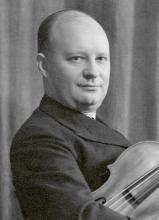
Paul Hindemith
Paul Hindemith (1895-1963) was a German composer, violinist, music theorist and conductor. He is regarded as one of the most important composers of the first half of the twentieth century.
Hindemith studied violin and composition at the Hoch Conservatorium in Frankfurt. In his early composition work, he took inspiration from late-Romantic composers like Richard Strauss, Franz Schreker and Arnold Schönberg. From the beginning of the twenties, he embraced Expressionism and later the principle of New Objectivity: music that is created for the music itself, rather than to convey a specific philosophical message. In this period, he wrote a great number of works in diverse genres, including a series of seven works called Kammermusik. He also remained active as a performing musician and was Professor of Composition at the Musikhockschule in Berlin from 1927.
In 1937, Hindemith emigrated to Switzerland, as the situation became untenable for him in Nazi Germany. Three years later, he left for the United States, where he became Professor of Music at Yale University. When he was offered a position as professor at the University of Zurich in 1953, he moved back to Switzerland.